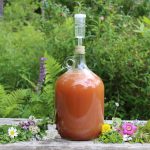Basic Herbal Beer (Gruit)
Herbal beer, also known as Gruit, has been brewed for centuries, long before hops became common in beer brewing. Depending on the herbs chosen, these herbal ales were used as medicinal preparations, or for everyday consumption simply because they were delicious. Learn how to turn any edible or medicinal herb into a tasty herbal beer!
Servings: 10 bottles (1 gallon)
Equipment
Ingredients
- 1 lb Sugar, Honey, or Malt Extract per gallon
- Herbal Tea of Your Choice
- Safale S-04 Beer Brewing Yeast or other Beer Yeast
Instructions
- Clean, rinse, and dry all equipment, work surfaces, and hands with soap and water. Clean the carboy or fermenting vessel well. A one-step sanitizer can really help with this (see equipment above).
- Use about 3 quarts to a gallon of water to make herbal tea with the herbs you've chosen. The amount to use depends on the herb, and stronger flavored herbs or those with more concentrated properties would require less. A general rule of thumb is about 1/2 cup to 3 cups of dried herbs per gallon of water.
- Add sweetener of choice and stir well to dissolve. When making beer, I like to use a simple dried malt extract as the sugar source, but herbal ales are also delicious with brown sugar.
- Pour the wort (sweetened herbal tea that's going to ferment) into the fermenting vessel, filling only to the shoulder of the bottle to leave ample headspace.
- Add yeast to the fermenting vessel per package instructions. Place the airlock on top to seal, allowing the CO2 from fermentation to escape but keeping contaminants out.
- Place the fermenting vessel somewhere at a cool room temperature, out of direct sunlight. Primary fermentation usually takes 1 to 2 weeks, depending on temperature, sugar, and yeast type. You're watching for when active fermentation slows, and you can't see the airlock bubbling for at least 5 minutes. For a more accurate approach, after the fermentation appears to have finished, take another specific gravity reading (a finished herbal beer will usually read 1.010 to 1.020).
- Once fermentation has stopped, clean and rinse bottles. Depending on the size of the bottles, prime bottles with ½ tsp sugar prior to filling. This will allow them to carbonate during bottle aging (flat beer isn't tasty, herbal or otherwise).
- Fill bottles with ale, leaving 1-2 inches of airspace in the bottle. Cap and label.
- Allow your herbal beer to bottle age for 1 to 2 weeks to build up carbonation before drinking. Keep it at a cool room temperature (really warm rooms can cause the mixture to ferment too fast and pop bottles).
- Once carbonated, either enjoy or store in a cool place for up to a year. Herbal beer is best enjoyed fresh; while it may keep a year, I'd suggest drinking it within 6 months of brewing. Enjoy!
Nutrition
Calories: 175kcal | Carbohydrates: 45g | Fat: 0.1g | Sodium: 0.5mg | Potassium: 1mg | Sugar: 45g | Calcium: 0.5mg | Iron: 0.02mg
